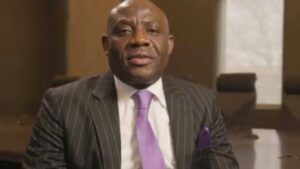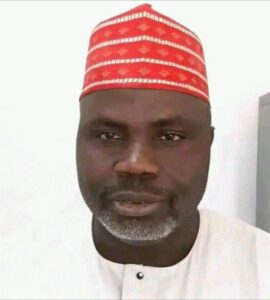We have been able to deliver many difficult projects — Sir Okwuosa, Oilserv GCEO
Group Chief Executive Officer, Oilserv Group, Sir Emeka Okwuosa, declared in an interview with Nigerian NewsDirect that huge investment in capacity building helped the Group in delivery of several pipeline projects in difficult and challenging terrains. Excerpts
We congratulate you on the award of CON by the president, and we are aware that it came in recognition of your enormous contributions in enlarging the economy through delivery of critical infrastructural projects. So, as a symbol of indigenous capacity in pipeline development, how are you prepared to participate in the transnational pipeline projects that are conceived to deliver African gas to Europe?
I want to use this opportunity to thank President Muhammadu Buhari for deeming Oilserv and me fit and deserving the national award of Commander of Order of the Niger (OON). I believe strongly that this is an award that takes into account the contribution of Oilserve or my personal contributions in the country; whether in oil and gas or in other areas of Nigeria’s economic and social development.
I also believe that I am not the only one that could have possibly gotten the awards. It is obvious that other people that were honoured deserve their awards too. So, I do not take it lightly.
I also appreciate your recognition of what Oilserv as a company has achieved. The truth is that at any time there is always much to do.
Oilserve has achieved a lot in the country over the past 25 year of its operations. The reason is that we deploy experienced folks and determination to make impressions first in the oil and gas industry and then in other sectors are areas of the entire country.
Yes, we have been involved in many projects; and we have been able to deliver many difficult projects: difficult in technical, difficult in environment and difficult sometimes because of the politics of what we do as human beings and organisations, and also difficult due to issues of security.
So we have been able to overcome very difficult situations and deliver projects to our very valued customers and clients. Oilserv has built several pipelines in difficult terrains: some on land, some in swamps and some on mountains and some across rivers. So I am delighted that a Nigerian company can develop the necessary skill sets and capacity that would enable development of oil and gas facilities of world class standards.
Having said that, opportunities will always be there as we move forward, because the economy will continue to grow. And as we grow the economy, the principle factors of economic activity will emerge. And in Nigeria today and most parts of the world, what is predominant in the energy field is gas.Of course oil remains important and will continue to generate its own values. I am sure that you that as of today that the bulk of foreign exchange and revenues that drive the Nigerian economy comes from oil and gas.
However, as far as the energy we deal with today, a lot of existing projects we are executing today and more that will come after that will be on gas. Gas is such an inventory riser that for you to produce, distribute and utilize gas you have to deliberately engineer and build the right infrastructure. You cannot store away gas the way we do oil. You have to build infrastructure that would match production with transportation and utilization. That is why you have pipelines; that is why you have LNG and CNG technologies for virtual transportation of gas. These take gas to utilization.
The biggest bottleneck in the utilization of gas energy in Nigeria today are the pipelines to distribute and of course the LNG for international sales and delivery.
So Oilserv is always ready and well prepared to be able to make the difference in the delivery of the emerging pipeline projects in the continent.
The Trans-Saharan Gas Pipeline is actually one of the two major international pipelines that are being envisaged. The pipeline is the one that will take off from Kano and go through Niger Republic and Algeria and end up in Europe.
The project that is actually hot now and is on board in terms of process is the Nigeria-Morocco which will run offshore West Africa to North Africa. It will go all the way from Niger Delta to offshore Lagos. It will then go through all the countries on the coast of West Africa until it gets to Mauritania. And then it goes on land from the back of Mauritania to Morocco where it crosses the channel until it gets to Spain.
So these are the key pipelined that are upcoming, and we are very aware of the opportunities and we have been part of that.
We know that it is a project that might require more than one contractor to execute, but we want to be part of it because we have the capacity to deliver our scopes.
At home the prevailing headache is pipeline vandalism; and many solutions have been proffered including the horizontal directional drilling technology in replacing the existing pipelines. Of course there are other security arrangement and contracts. How best do you think the problem could be solved?
Pipeline vandalism is not peculiar to Nigeria. It has been exiting in Nigeria for decades, but it has been exacerbated in the past few years. It became prominent and impactful on the operations of the oil and gas industry starting from the 2000s. But today it has been in the news of course, but there are quite a few ways to tackle this problem. What is important is that every problem in the industry actually has solution.
What do we do? It is just to sit around it and strategise on the right solutions that are cost effective and deliver the goals. Nigeria needs to be able to secure industry production whether is oil or gas.
Gas is not easily stolen because you cannot safely keep the stolen pipeline gas. The problem however is that most of the gas produced in Nigeria is associated with oil production. So whenever oil production goes down, it affects production of gas too. So pipeline vandalism simultaneously affects oil and gas production.
There are quite some existing methodologies to solve the Nigerian pipeline problems. In some areas it makes sense to use the horizontal directional drilling which the HDD you mentioned; in some other areas we have the methodologies where we can reinforce the pipelines and make those pipelines in invulnerable to sabotage. Oilserve has that technology. That technology is already tested in the United States and it is working there.
Most importantly, beyond technology, is for us to develop a system that recognizes the problems we have in this country, find out the root cause of it, and deal with the root cause besides dealing with the sectors. That will require the concerted efforts of everybody: people in government, NNPC Limited, IOCs, and in fact all the producers. It also involves all the communities. It involves governments at all levels: Local Governments, State Governments and Federal Government.
I can tell you clearly that Local Governments are very impactful because they deal with people at the level you can see who is doing what.
So yes, in protecting the pipelines there are instances where you can use the HDD to mitigate vandalism and solve that. There are also instances where you may not be able to use the HDD, and you can actually apply technology to reinforce the pipelines with special coatings that would make it impossible for anybody to find them accessible.
What you have to know is that in all this, it will require serious investments because it is going to cost you more to utilize these methodologies rather than use standard construction methods. But at the end of all these, what is important is that it is going to save you more damages. It will actually save you more especially with the regards to the products. So that is the way it is.
How has the frequent production downtimes affected the activities of service companies in the industry?
Thank you for that question.
I will be very blunt and tell you that vandalism and other events that force players to shut-in production is impacting Nigeria as a country very seriously. It is impacting oil and gas companies extremely badly. Some of them have shut down operations for once. Imagine the cost you carry in the course of your operations, and are going to sustain that business with that level of cost when you have shut-in your production.
So what about the other stakeholders like the service companies that are mostly impacted? Because when you shut your operations, you can no longer retain the services of these companies. And these service companies are Nigerian companies, so they produce multiplier effects. And that is why it is important to find a solution quickly because the multiplier effect on the economy is very bad.
Actually, a lot of the service companies are struggling since the past years because there is nothing to do. Imagine when you have the NCTL that has capacity to flow hundreds of thousands of barrels per day shut down for a year. You have the Trans-Forcados shut down, and you have other export pipelines shut down. What that means that companies that feed these pipelines are shut down. And if the operating companies shut down, then they won’t need the services companies.
So the perspectives for the service companies under the prevailing circumstances are extremely negative. As I have said, quite a lot of service companies are virtually doing nothing. What it means is that revenue is not there. What it also means is that some of the service companies are in the situation of shutting down their businesses.
Of course, laying off staff has been going on for quite a while but the numbers will be visible when companies do their numbers but as at today I can tell you it is hurting. It is hurting the service companies and it is hurting the producing companies. The producing companies are hurting because most them have no production.
Government’s gas monetization programmes have suffered traditional delays due to funding crunch. But with the rising price of gas, how can the market assist with supply?
Basically, from the project development point of view there is no project in this world that is conceived for development with proper strategies that by the end of the day would not have one issue or the other. In the case of Nigeria, we have our own peculiar situation, other countries have theirs.
I mentioned it earlier that gas development requires infrastructure. Without the right infrastructure, you cannot utilize gas. And when you talk about infrastructure, you talk finance. And there are many projects scattered across the world. So, projects around the world are struggling for the same finance, and the finance we are talking about are not five million dollars or ten million dollars. Sometimes, these finance issues run into billions of dollars. And we do not have the capacity to fund these projects entirely within the country. In most cases the funding syndication involves international members and Nigerian banks.
And for real big ticket projects, Nigerian banks take a smaller chunk. With that, it takes time to actually put together a financing plan and execute it. It is a process because part of it is looking at the risks involved, and being able to mitigate them as far as banks are concerned. And I can tell you, in finance contracting; banks do not look at risks the way we in technical services look at them. Finance people look at risk as total. So you have to mitigate all before they can check the boxes. So that leads to delays.
In actual execution, you also have issue that impact speed: logistics issue, sometimes security and management issues. But I can tell you that in all the initiatives, the NNPC Limited is driving the government’s gas development initiatives very strongly.
A lot of pipelines are being built today for transmission and distribution of gas is being driven by NNPC Limited, and they have achieved quite a lot within the confines of the amount of funds they can muster. And with what we have today and What is important is that in the course of anything we do around the communities we employ people from the locations. We have workers that earn income to feed into the communities to create positive economic impact.
We also employ the security people from host communities because the most primary aspect of security is local security. When you have the community working with you and they are happy it is easier to secure what you are doing.
So it is deeply driven by our desire to impact positively on our communities. Secondly it is on realistic situation because the fact remains today that everywhere in the world if you don’t engage the communities and the people you impact on it is only a matter of time you find what you are doing unsustainable. So it is natural.
Finally of course it is driven by the commitment to be able to contribute to the development of the country in our own little way together with the government. I believe strongly that if every company impacts positively in areas where they operate, we will build up a momentum of development in the country because there are many ways to influence the economy of the country and the people. And this is one of them.
This is why service business is important for the country in the oil and gas industry because the service business is what enables the trickledown effect on whatever activity and the benefits that come from the industry. It is through employment, it is through services, it is through engagement and it is through positive presence in these communities. The communities wherever they need this, like I believe, we will do our best to enable it happen.
In specific terms, there have been some attention-grabbing social responsibility investments your company has made recently involving hospitals and others.So where are going with such service based interventions?
Thank you for that. We have done quite a lot in the past 25 years. I cannot begin to count them, but of recent we have built a girls’ secondary school. Today, we continue to expand it. We have just laid a foundation stone for a very modern dormitory that will be able to house as many as a thousand students. It is quite a mega project of high status.
For the hospital, we chose to build a cardio-thoracic hospital that is very specialized. It is a 57 bed hospital; out of which 14 beds are intensive care units: full-fledged ICUs. And when you talk of cardiology centre, it is not just a normal or standard hospital. It is beyond that. We have facilities ranging from CT scan, catlags, digital x-rays, and many more.
We just don’t end it up there. We also know that for it to be effective, we have to employ the best. We have a partnership with a foundation based Econostation, United State. And the foundation is non-profit Voom Foundation. They work in collaboration with our own Sir Emeka Okwuosa Foundation which is principally driven by the Oilserv Group. Our foundation is also non profit and we have been doing quite a lot, but in this regard we go beyond just setting up a hospital. We also have medical fairs like this one that will be coming up on the 28 of this month for two weeks. And that would be the second one for this year where we will have about 45 medical doctors coming in from United States and Sweden to carry out open heart surgery. You might be aware that in the last medical fair that we did, we carried out eight open heart surgeries. And these were done free of charge to the patients. You can only imagine what it means. You check and see how many open heart surgeries we have in Nigeria a year to now see one hospital carry out eight in 10 days.
Next one we are carrying out will involve minimum of 14 open heart surgeries out of which the majority will be paediatric cases. And it is going to be the first if its kind. Paediatric cardiologic cases are very specialized. For those who are in medicine they will understand that. This is what we are going to be carrying out between 31st of this month and mid November.
The hospital is named after my late mother who inspired me a lot, Dame Irene Okwuosa Memorial Hospital. Search it online and see the impact it is making today in the medical area. For me and for us it is part of the story of how we are continuing to see how we impact on the society besides just running our business. And I believe that this hospital and other areas where we impact on the communities, especially education and other areas will make a difference.




